Middle East and North Africa (MENA)
Overview
Spanning from the northern portion of the African Continent to the countries of the Middle East, this region encompasses the vast geographic area from the Black Sea to the Arabian Sea. It is also home to the “Fertile Crescent”, which is commonly associated with the dawn of modern human civilization. With a long and storied history, the region is now home to over half a billion people. MENA is in many ways a study in extremes, with some of the world’s richest countries existing alongside some of the poorest and most conflict-affected. The source of much of this wealth, petroleum, has also been continuous since its discovery. Development challenges faced by the region include active conflicts (which have caused the forcible displacement of millions), high unemployment and poverty rates in some countries, and the effects of a changing climate on many already warm and arid regions.
Projects

- Partner(s): Moroccan Ministry of Economy and Finance, UNDP Morocco (Funder)
This project, supported by UNDP Morocco and the Moroccan Ministry of Economy and Finance, aimed to improve official statistical methodologies by using Big Data, in order to improve the timeliness and reliability of progress towards the Sustainable Development Goals. Additionally, this project contributed to strengthening the Moroccan digital ecosystem by improving the design, implementation, and monitoring of fair public policies, and informing better investment decisions towards achieving g the SDGs. Our organization conducted a benchmark study and developed three pilot publications to monitor priority indicators for sustainable development in Morocco: mental health (target 3.4) using Google Trends data; water stress (indicator 6.4.2) using earth observation; and ICT skills (indicator 4.4.1) using data collected through an online survey in Facebook.
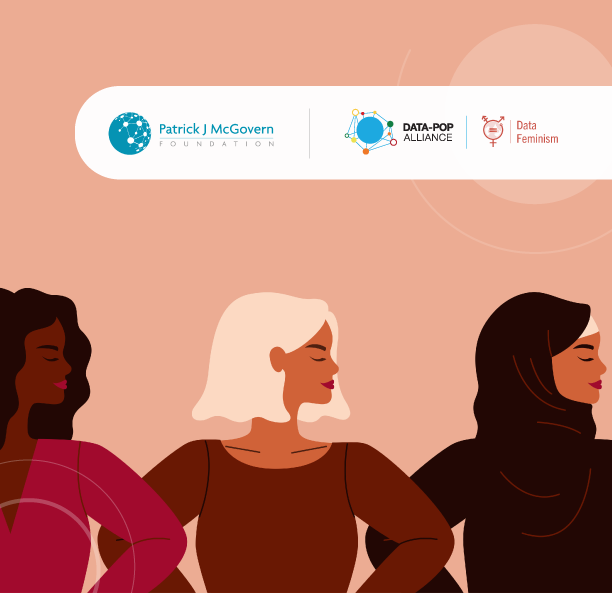
- Partner(s): Patrick J. McGovern Foundation (Funder)
The Patrick J. McGovern Foundation (PJMF) awarded DPA’s Data Feminism Program a twelve-month, $300,000 grant to support our work advancing intersectional, data-driven research, training and advocacy to continue fostering gender equality across Latin America and the Caribbean, the MENA region and Sub-Saharan Africa. In 2023, the grant was renewed for $400,000 to continue supporting existing and new Data Feminism Initiatives, including the Book and Movie Club, “Technology Through Feminist Lenses.”

- Partner(s): Global Partnership on Artificial Intelligence (GPAI), International Centre of Expertise in Montréal on Artificial Intelligence (CEIMIA), Mila (Funder)
Mila’s AI for Humanity Team identified high-impact, socially beneficial projects and invested in their development and deployment. AI offered possibilities for enhancing well-being and contributing to the SDGs but also had the potential to deepen divides. AI was generally designed and evaluated without systematic gender and diversity approaches, potentially leading to negative consequences. This project aimed to provide the AI ecosystem, particularly the member States of the Global Partnership on AI (GPAI), with a framework of tools and recommendations to ensure diversity and gender equality throughout the AI cycle. DPA provided technical, organizational, and research support for GPAI’s Project on DGE in AI, organizing consultations and data collection with advisory groups from various sectors, focusing on marginalized and minority groups globally.
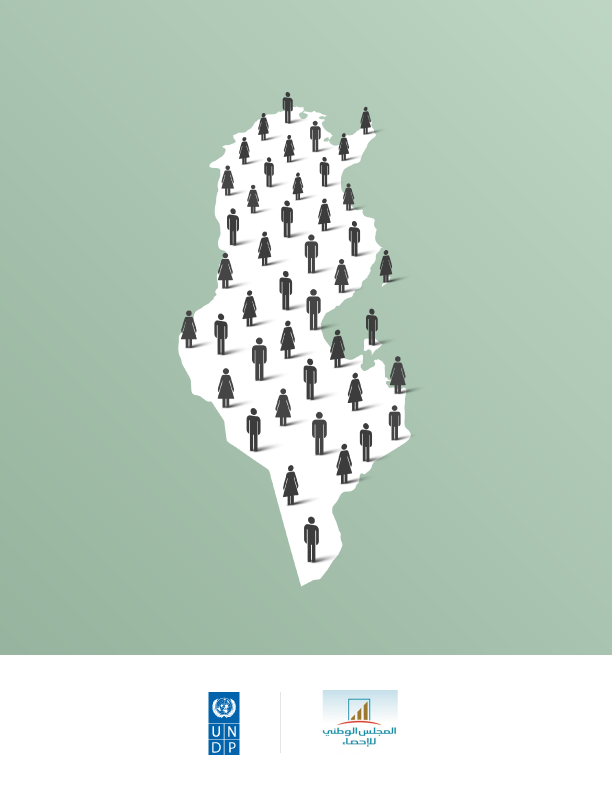
- Partner(s): National Institute of Statistics in Tunisia, National Statistics Council of Tunisia, UN System in Tunisia, UNDP Tunisia (Funder)
DPA, in collaboration with the UN System in Tunisia and under the implementation leadership of UNDP Tunisia, provided technical support to the National Statistics Council (NSC) and the National Institute of Statistics (INS) in the development of the first National Strategy for the Development of Statistics (NSDS) in Tunisia. The process of the NSDS development included:
(1) Identifying the strengths, weaknesses, and needs of the Tunisian National Statistical System (NSS) through a comprehensive strategic diagnostic of the NSS;
(2) Developing a 5-year National Strategy for the Development of Statistics that facilitates the timely production of reliable statistics to contribute to informed public policymaking aligned with the SDGs;
(3) Developing an advocacy and communication plan to accompany the NSDS implementation, and
(4) Developing a three-year action and financing plans to effectively implement the strategic orientations defined in the NSDS.
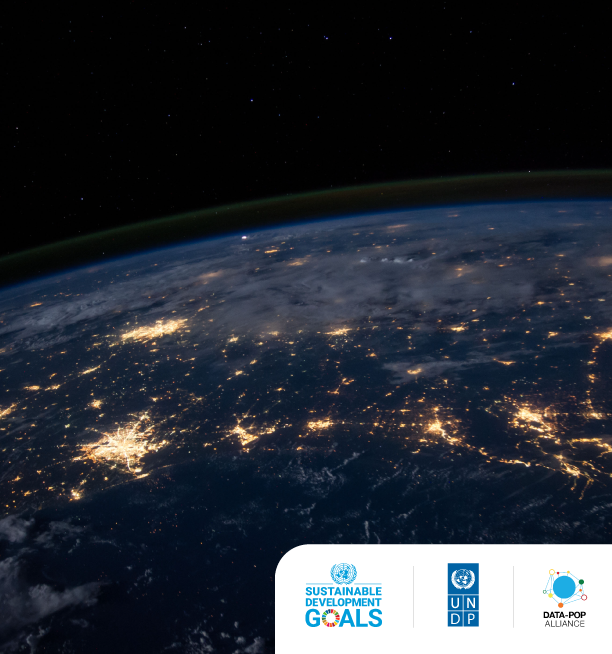
- Partner(s): UNDP (Funder), UNDP Europe and Central Asia
In partnership with the United Nations Development Programme (UNDP), DPA provided support to the Europe and Central Asia Regional Hub in Istanbul for the project “Measuring the Unmeasured” to contribute to SDG measurement and achievement. The effective use of data for public policy was of critical importance to the UN in its efforts to strengthen evidence-based programming and policy development. In particular, generating, analyzing, presenting, and using data was vital to global and regional efforts to monitor and promote the Sustainable Development Goals (SDGs). Our project aimed to scope, develop, and test different methods for measuring Tier III indicators of high SDG priorities for 11 countries in the Arab States, Europe and Central Asia, and Asia Pacific, with the main goal of utilizing this information in policy responses.
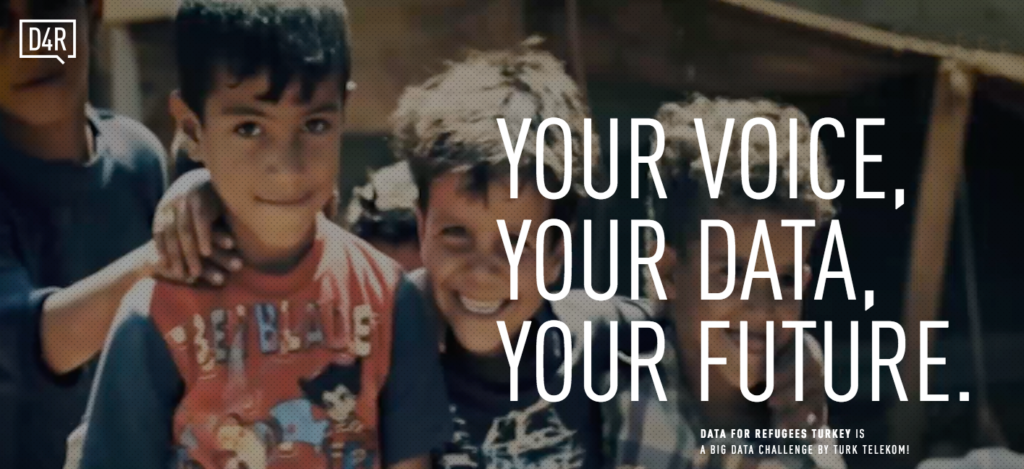
- Partner(s): Bogaziçi University, FBK, IOM, MIT Media Lab, Türk Telekom, Turkish Academic and Research Council, UNHCR Turkey, UNICEF
For this challenge, DPA collaborated with various Turkish institutions such as Türk Telkom (the country’s leading telecommunication operator) in collaboration with Boğaziçi University, TÜBİTAK (Turkey’s Scientific and Technological Research Council), the MIT Media Lab, FBK, IOM, UNHCR, UNICEF, to make several anonymized datasets of mobile phone users available to international research teams. The goal was to develop projects to analyze and improve the living conditions of Syrian refugees in Turkey, with a specific focus on safety, health, education, unemployment, and integration.
Two publications resulted from this project, the article “Data for Refugees: The D4R Challenge on Mobility of Syrian Refugees in Turkey”, and a chapter of the book “Guide to Mobile Data Analytics in Refugee Scenarios”.
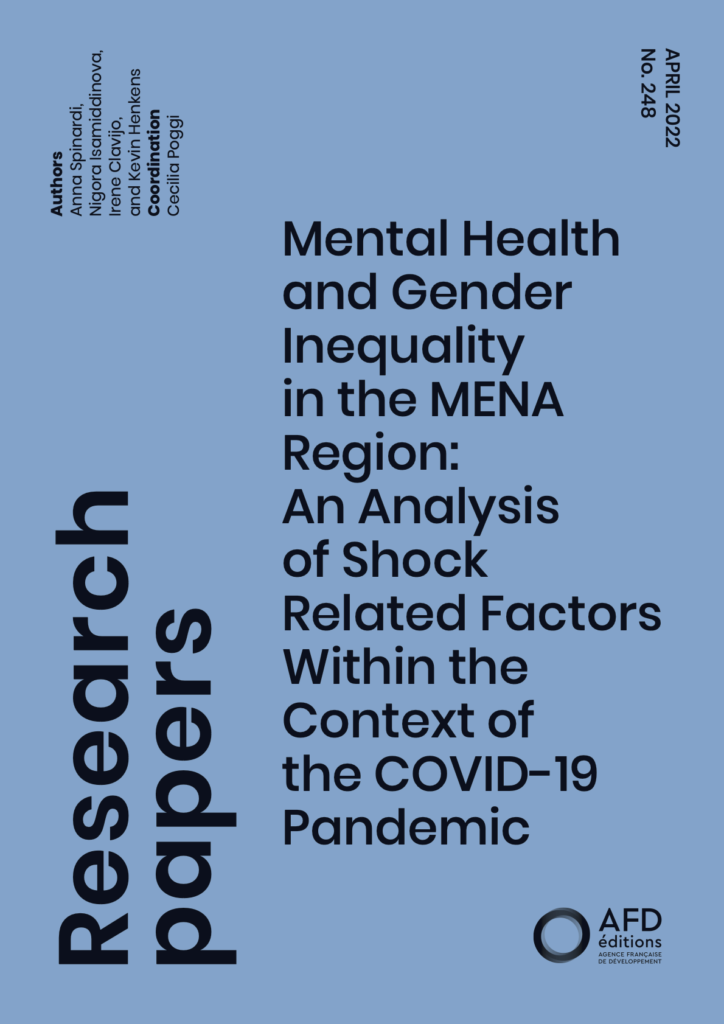
- Partner(s): Agence Française de Développement - AFD (Funder), Economic Research Forum (ERF)
In partnership with the Agence française de développement (AFD) and the Economic Research Forum (ERF), DPA produced a research paper investigating the potential associations between the socioeconomic impacts of COVID-19 on gendered mental health inequalities in the MENA region. The study adopted a mixed-methods approach, including a thorough literature review and quantitative data analysis using the Oaxaca-Blinder (OB) decomposition model. The results of this study were used to produce a policy paper with targeted recommendations to mitigate the impacts of the pandemic on women’s mental health and improve their social and economic well-being.
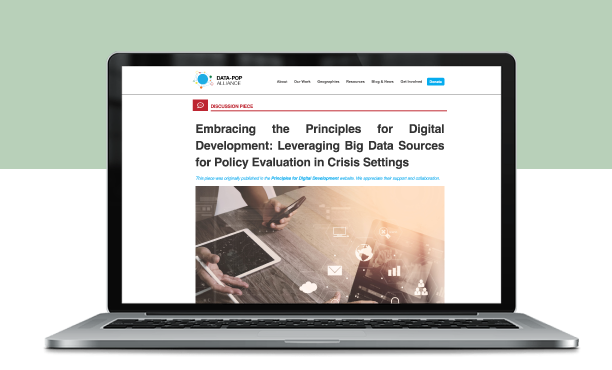
- Partner(s): Central Administration of Statistics (CAS) - Lebanon, Department of Statistics (DoS) - Jordan, UN ESCWA (Funder)
Following an initial collaboration with UN ESCWA for the assessment “Leveraging Behavioral and Humanitarian Data Sources to Analyze the Development Challenges Faced by Syrian Refugees and Host Communities in Lebanon”, this project focused on utilizing non-traditional Big Data sources, such as social media and Google search data, to provide timely insights in crisis settings on key topics (economic indicators, access to food, sentiments around specific policies, etc). The DPA team collaborated closely with the Central Administration of Statistics (CAS) of Lebanon and the Department of Statistics (DoS) of Jordan and held several trainings and workshops around the project output.
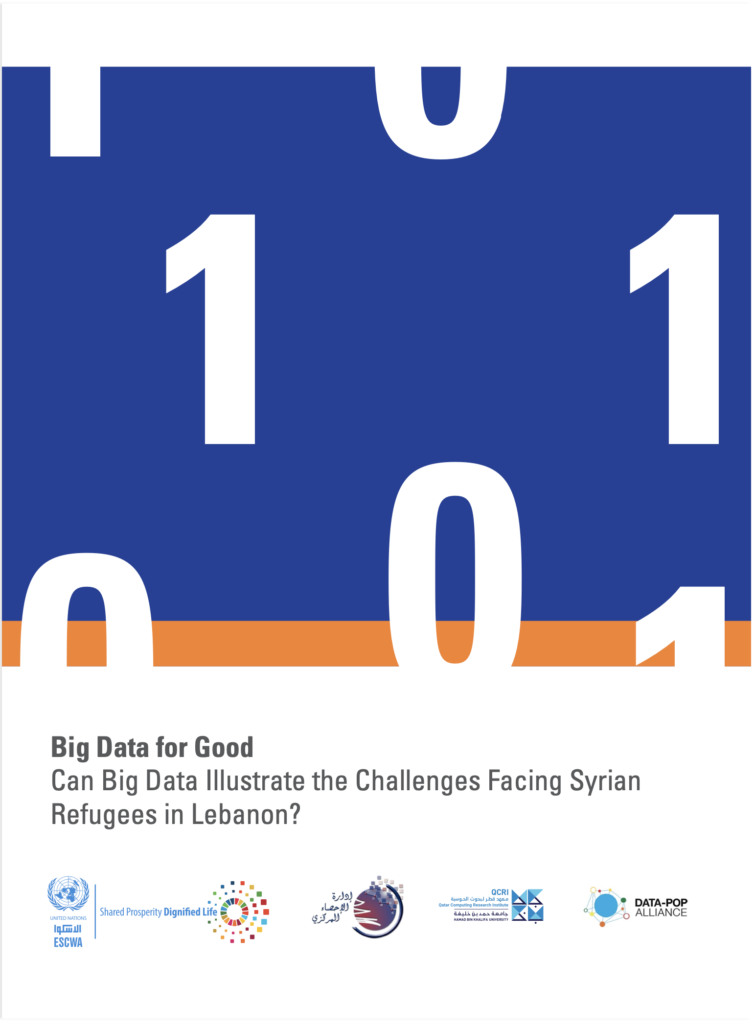
- Partner(s): UN ESCWA (Funder)
In partnership with United Nations Economic and Social Commission for West Asia (UN ESCWA) and the Qatar Computer Research Institute (QCRI), this project aimed to understand the extent to which particular sets of non-traditional data sources — or crumb — and methodologies related to Artificial Intelligence can provide insights on the living conditions of Syrian Refugees and host communities in Lebanon. In particular, indicators related to human capital, poverty and demographics were explored. Data from the Central Administration of Statistics (CAS), UN agencies, telecom operators, social network data, amongst others, were used to shed light on the living conditions and interactions of Syrian refugees and local communities in Lebanon. Grounded in the Lebanese context, the project showed how these types of approaches may help national, international and local organizations develop better policies and programmes to meet these populations’ needs, while also providing pathways for them to weigh in on access to data about them.
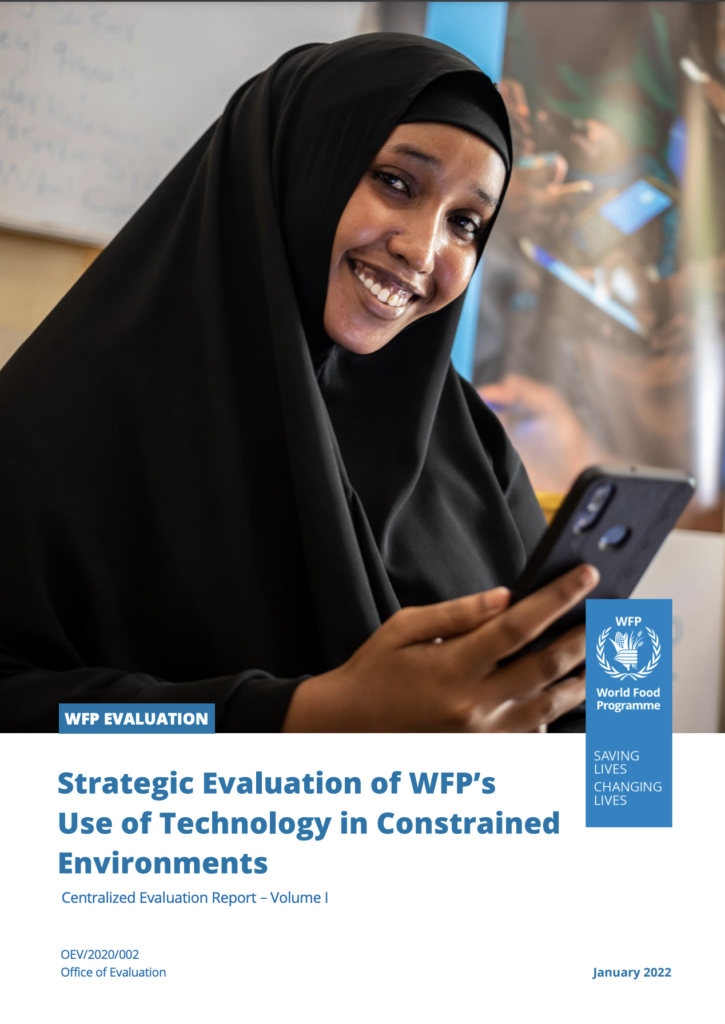
- Partner(s): ADE (Funder), World Food Programme
This evaluation, developed in collaboration with ADE, examined the extent to which WFP effectively and efficiently deployed the most appropriate Information and Communication Technologies (ICTs), and how, why, and under which conditions the use of these technologies contributed to management and program objectives. The team designed a mixed-methods approach consistent with WFP’s proposed analytical framework and outlined the factors affecting technological innovation and diffusion. Additionally, six case studies were conducted in Jordan, Niger, Iraq, South Sudan, the Democratic Republic of the Congo, and Bangladesh.
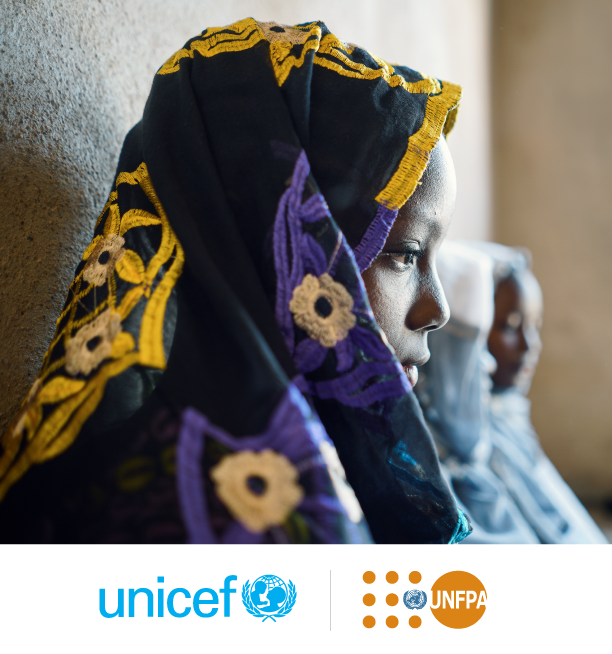
- Partner(s): UNFPA, UNICEF (Funder)
The need to end child marriage and FGM has never been greater –without accelerated progress to end both of these harmful practices, millions of women and girls across the globe will continue to be in danger. DPA, in collaboration with UNICEF and UNFPA, conducted a comprehensive landscape mapping and review of key technology-based interventions to address child marriage and FGM across 13 countries in Africa and Asia (Bangladesh, Burkina Faso, Egypt, Ethiopia, Ghana, India, Kenya, Mozambique, Nepal, Sierra Leone, Sudan, Uganda, Zambia). During the second phase of the project, DPA carried out an in depth review of three selected interventions to better understand their effectiveness, key success factors, and potential areas for improvement.
The methodology proposed by DPA was based on intersectional feminist approach and an analysis integrating both quantitative and qualitative research methods, as well as traditional and non-traditional data sources collected at different stages of the study, underpinned by a participatory approach involving UNICEF, UNFPA, and other stakeholders.

- Partner(s): UNESCO (Funder)
The main objectives of this feasibility study were to evaluate the capacity and skills of the AI Movement in Morocco to fulfill the intended role and objectives and to align with UNESCO’s principles and requirements to become a Category 2 Center. This report presented the evaluation results based on the nine criteria outlined in Document 40 C/79, following visits to the center’s facilities and interviews with representatives from the center, University Mohammed VI Polytechnique, and UNESCO. The first section, “Strategy and Programs,” assessed the alignment of the center’s strategies and programs with those of UNESCO and their contribution to global development, including the achievement of the SDGs. Section 2, “Management and Governance,” presented the evaluation results of the governance framework, operational functioning of the center, human resources, and available infrastructure. The third section, “Sustainability,” provided an overview of the current financial and operational sustainability status and future projections.
